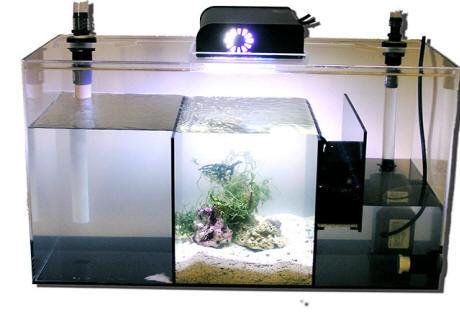Thank you for visiting! By the way… any links on this page that lead to products on Amazon and other stores/partners are affiliate links Aquarium Store Depot earns a commission if you make a purchase.
Algae scrubbers are finally starting to pick up mainstream acceptance in the Reefkeeping community! As someone who has advocated Algae Turf Scrubbers, for many years it great to see them more widely accepted. There is still a lot of skepticism in the industry though and many store still push other products and solution. I created this article below so you can see the differences between an Algae Scrubber (AKA Algae Turf Scrubber) and other solutions like there. There will be affiliate links in this article as a quick disclosure where I may make a commission should you make a purchase from the link at no charge to you. Let’s get started.
Algae Scrubber vs. Algae Blocker
Ah the Algae blocker. This is a very common solution you will hear about at your Local Fish Store (LFS) when a customer comes in with an algae problem. I think of these as the diet pill solution to nuisance algae in the industry.
What is a blocker?

An algae blocker is a chemical product that will work to remove nuisance algae in the aquarium. The most well known algae blocker is Boyd Enterprises Chem Clean who sells a Cyano blocker. The industry has gotten really good over the years and have created reef safe solutions that will remove algae, but will not harm inverts and corals.
Why is this better than the Blockers?
An algae blocker’s purpose is to quickly remove algae, but it is not an end all solution. They really are meant to wipe out nuisance algae after the long-term problem is treated – usually a poor water source or bad aquarium housekeeping. They become expensive to use long-term.
An Algae Scrubber on the other hand, is a natural solution to nuisance algae. The algae you grow in the scrubber sucks up the nutrients that feed other forms of algae, and the algae is keep in one spot where you can remove it. Scrubbers are always a long-term investment in the aquarium as they do not need ongoing filters or replacement parts.
Is The Reactor Different?
Algae reactors have been commercialized recently with the raise of Algae Scrubbers.
What is a reactor?

An algae reactor is a self container container that grows macro algae like cheato. They are pretty complex units, with a reactor chamber, pump, and lighting all functioning in the unit.
The biggest advantage to an algae reactor is ease of use and simplicity. While an Algae Reactor has a comprehensive unit, an algae scrubber has simple individual parts. This means that if one part breaks, it is easier to fix vs having to buy another unit.
Biopellets
Biopellets have been a solution for denitrification for years
What is a Biopellet Reactor?

Biopellets themselves are a polymer that is made up of bacteria. They are meant to be a supplement to the beneficial bacteria in your aquarium. The main draw is these biopellets will remove nitrates. They require a reactor so you can efficiently work the materiel and cultivate the bacteria.
What is better than Biopellets?
Biopellets can be tricky to dial in and can actually strip too many nutrients in your tank. Stability of the operation is there biggest issue. You also still need to address phosphates requiring another equipment solution. An algae scrubber handles both nitrates and phosphates and are easier to operate once they are broken in.
Cheato
Cheato was the first acceptance of using algae to control nutrients in an aquarium
What is Cheato?

Cheato is single celled macro algae that is simple to grow and easy to place in a sump. It is one of the easiest and simpliest ways to control nutrients in a tank
Which is better than Cheato?
The main advantage you will get from a scrubber is surface area growth. Scrubbers have the ability to grow more nutrient absorbing algae in a concentrated space then cheato. You need a lot of cheato to control nutrients and you need the space in your sump to do it. The major downfall is the risk of pests and disease from Cheato. Yes, that is correct Cheato can bring over a number of pests and diseases. Unless you Quarantine your Cheato (very few people do this) or you get your Cheato from a source that guarantees clean Cheato (like Algaebarn), it is always a risk. With an Algae Turf scrubber, you are growing your own algae from your own tank. You are in full control of what comes in and out through your introduction procedures with your fish, inverts, and corals.
But other than that cheato is and will always be a cheap and go solution for nutrient control. It is algae after all and a natural way of removing nutrients in the aquarium.
Denitrator
Denitrators were a solution to aquariums for many years until other products like Zeovit and Biopellets came about.
What is a Denitrator?

A denitrator is a piece of equipment that has been used in wastewater treatment plants and public aquariums for years. Denitrators are the solution to using a traditional media bag in the sump which is harder to manage optimally. A denitrator pieces the media in a chamber where the water can properly react to it resulting in consumption of nitrates.
Which is better than a Denitrator?
A denitrator system and a built algae scrubber equipment wise are around the same price. The main advantage you will get with an algae scrubber is you will not need to replace your media and the parts are easier to replace. The other advantage that an algae scrubber will have is that it will remove phosphates while the denitrator will only remove nitrates. You will need to invest in other equipment to control phosphates.
GFO (AKA Phosban)
GFO is a common media used in saltwater aquariums. Phosban is the big name brand that sells GFO.
What is GFO?

Granular Ferric Oxide or GFO is media that is used in an aquarium to remove phosphates. It is also used to remove heavy metals and other toxins in the aquarium. Generally, GFO is placed in a reactor for optimal use.
Which is better than GFO?
Investing in a GFO system will incurring recurring costs as the media will need to be replaced every 1-2 months. GFO also does not remove nitrates, meaning you will need another piece of equipment or solution to remove nitrates from your aquarium. An algae scrubber will remove both phosphates and nitrates and will not incur recurring costs.
Refugium
For reefers who have a sump, it is very common for them to have a flex space that is used to create a Refugium.
What is a Refugium?

A refugium is usually a section in a sump that is reserved to in order to provide a place for certain organisms to survive. In general, these would be organisms like copepods, macroalgae, and certain inverts.
Why is this better than a Refugium?
A refugium is also usually used to grow macroalgae for nutrient control and be a place to grow copepods. An Algae Scrubber is actually great at both. It grows algae like crazy and copepods thrive inside the mesh of the scrubber. It is very common when you clean an algae scrubber that you can remove hundreds of amphipod and copepods from the scrubber. No other piece of equipment does a better job at growing them. This allows you to do more in the flex space of your sump.
Zeovit
Zeovit is a nutrient free solution that is touted in the reef aquarium industry.
What is a Zeovit System?

Zeovit is a system that produces an ultra low nurtrient system. It utilizes bacteria to eliminate nutrients at the initial source – Ammonia.
Why is an this better than a Zeovit system?
Zeovit systems are pretty complicated to setup and expensive. It is not a cookie cutter system and every system is different. Dosage and product needed for your system will differ. An algae scrubber on the other hand, is all about simplicity. It is easy to setup, easy to clean, and easy to get results.
Zeovit is really a product of the saltwater aquarium industry, which loves to market the latest and and greatest high-tech toys and solutions to hobbyists. It is a great product, as long as you can dial it in, but overly complex.
Natural and Simple
An algae scrubber is natural and simple and nature is not a solution that is going to be outdated or obsolete. Always do your research regardless of what you end up purchasing. Let us know your experience with equipment or any questions in the comments.
- About the Author
- Latest Posts
I’m thrilled that you found Aquarium Store Depot! Here you’ll find information on fish, aquariums, and all things aquatics related. I’m a hobbyist (being doing this since I was 11) and here to help other hobbyists thrive with their aquariums! I adhere to a high quality Editorial Process and Review products with real life field usage and practical analysis.






Very interesting but unfortunately, i not have sump 🙁
Can I use only algae scrubber system ?
Hi Amru,
Yes you can. I know several reefers who just use an algae scrubber. A well designed and well run scrubber can replace a protein skimmer and most equipment over time. The biggest issue I’ve personally found with scrubbers is they do too good of a job so they have to be dialed back so you aren’t really in extremely low nutrient levels.